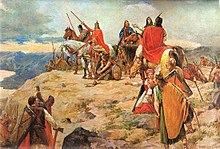User:Wüstenfuchs/sandbox
Early feudal Croatia
[edit]Formation of the Croatian state
[edit]
Croatian state was formed in the hinterland of the Dalmatian cities of Zadar, Šibenik, Trogir and Split. Between 7th and 8th century, Croatian society saw process of ploarisation in which yeomanry become serfs. In early Croatian history there were no slaves, however, later, one could become a slave by buying or selling, debt bondage or by voluntary serving the Church. With development of feudalism, yeomanry (vilani) started to disappear. The yeomanry was gifted along with land to feudals, while at the same time feudals become rich. Croatian feudals were previously warlords or chieftains which enriched by robbery and loot or they were members of king's troupe which king elevated to nobility.
Main factors that developed the polarisation of the Croatian society were wars, the Church and Dalmatian cities. In wars, warlords and chiftains gained the largest summ of loot, while yeomanry payed war expenses and served in army. The Church in Croatia used its influence in achieving a feudal status. With its organisation, it served as an example for the Croatian feudals and the Church influented ruler advising him how to control his subjects. Another advantage of the Church was that only clerigy was literate. Dalmatian cities were in a better position then rest of the Croatian cities, both in economy and organisation. Croatian upper stratum endeavored to benifit from excesses of the Dalmatinian cities. Such development of events led to total polarisation of the Croatian society.
Foreign relations and wars
[edit]In the early feudal Croatia, Croats confronted Avars and later the Byzantine Empire, however, the most significant conflict was the wan against the Frankish Kingdom.
Franks allowed inner self-governing to Croats, leaving right to chiftains to elect their dukes. After Charlemagne died in 814, an anarchy appeared in the Frankish Kingdom, and withit separatist ideas appeared as well. During the time, Frankish feudals try to expand their properties on expens of Croatian dukes, which led to an idea about statehood amongst the Croatian upper stratum. Ljudevit Posavski, led by this idea, launched a reballion against the Frankish rule in the Pannonian Croatia. The rebellion failed due to power of the Frankish feudals and involvement of the Duke of the Dalmatian Croatia, Borna, who supported the Franks.
